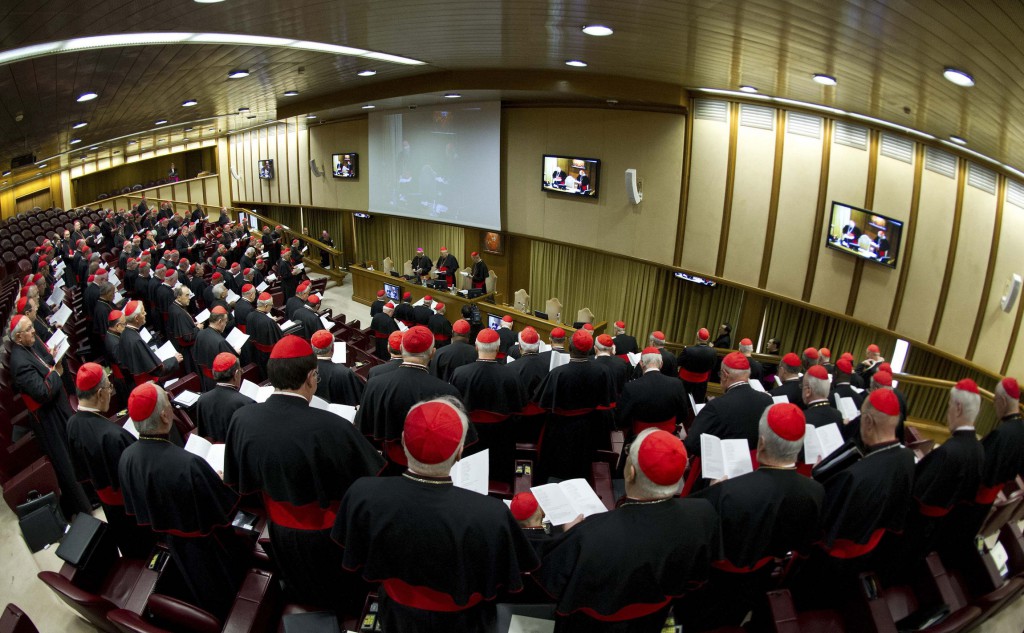
By Cindy Wooden
The College of Cardinals began their formal pre-conclave meetings March 4 with 142 members present, 103 of whom are under the age of 80 and eligible to enter the conclave to vote for a new pope.
Jesuit Father Federico Lombardi, the Vatican spokesman, said the cardinals did not set a date for the conclave to begin and were unlikely to set a date until the 115 cardinal-electors expected were all present and until the cardinals felt confident they knew how much time they wanted for discussions beforehand.
One of the first decisions made by the cardinals was to authorize the drafting of a message to Pope Benedict XVI, Father Lombardi said. He did not know when the text would be completed and approved.
The cardinals also voted to listen that evening to Capuchin Father Raniero Cantalamessa, preacher of the papal household, give the first of two meditations required by church law before a conclave.
The rules for electing a pope require the cardinals to choose two churchmen, “known for their sound doctrine, wisdom and moral authority” to present meditations “on the problems facing the church at the time and on the need for careful discernment in choosing the new pope.”
Father Cantalamessa also gave the first meditation in 2005 after the death of Blessed John Paul II.
After praying for the presence of the Holy Spirit, the cardinals and those assisting them at the meetings took an oath of secrecy. During the pre-conclave meetings, known as general congregations, the cardinals have the services of translators working in Italian, Spanish, English, French and German, as well as ushers and other aides.
Father Lombardi also was among those who took the oath; he is authorized to give reporters only certain general information about the meetings. For example, he said, 13 cardinals spoke during a 45-minute discussion about how often the general congregation should meet and how the sessions should be organized, but he could not say who the cardinals were or what they suggested.
The cardinals also drew lots to determine the three cardinals who will serve three-day terms as members of the “particular congregations” to deal with ordinary matters in the governance of the church during the period without a pope. Serious matters must be brought to the general congregation.
The three cardinals chosen March 4 were Italian Cardinal Giovanni Battista Re, former prefect of the Congregation for Bishops; Italian Cardinal Crescenzio Sepe of Naples; and Cardinal Franc Rode, former prefect of the Congregation for Institutes of Consecrated Life and Societies of Apostolic Life.
Each of the cardinals has been given a small prayer booklet, the rules for governing the church during the period without a pope and for electing a new pope, a list of all the cardinals and the official prayer book for the conclave.
The cardinals had a half-hour coffee break, the spokesman said, and used the time to meet cardinals they didn’t know and to greet old friends.
Father Lombardi said only two cardinals — Indonesian Cardinal Julius Darmaatmadja, the 78-year-old retired archbishop of Jakarta, and Scottish Cardinal Keith O’Brien, 74, who retired as archbishop of St. Andrews and Edinburgh after being accused of sexual misconduct — have formally informed the Vatican that they will not attend the conclave.
The cardinal-electors missing from the first congregation, he said, were Cardinals Antonios Naguib, former Coptic Catholic patriarch; Bechara Rai, Maronite patriarch; Joachim Meisner of Cologne, Germany; Antonio Maria Rouco Varela of Madrid; Zenon Grocholewski, prefect of the Congregation for Catholic Education; Karl Lehmann of Mainz, Germany; Jean-Baptiste Pham Minh Man, Ho Chi Minh City, Vietnam; Theodore-Adrien Sarr of Dakar, Senegal; Kazimierz Nycz of Warsaw, Poland; Dominik Duka of Prague, Czech Republic; Rainer Maria Woelki of Berlin; and John Tong Hon of Hong Kong. – CNS